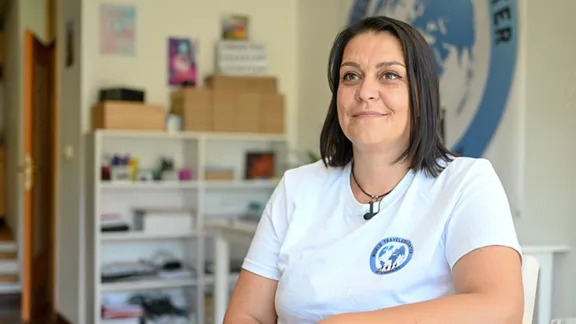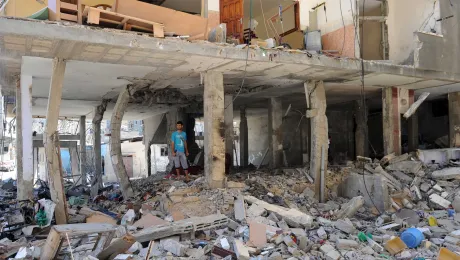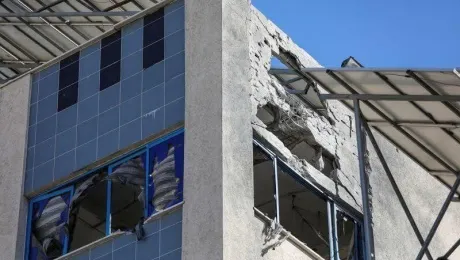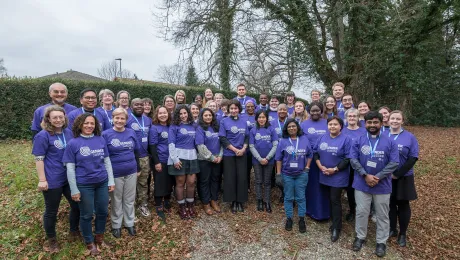From life as a refugee during the Bosnian war to founder and CEO of an integration center to support other people seeking safety from today’s wars and conflicts – listen to Sanela’s story

Sanela Klepić, founder and CEO of INTERGreat. Photo: Ajdin Kamber
Living as Neighbours: Sanela Klepić, founder and CEO of INTERGreat Daily Integration Center in Sarajevo
(LWI) - "Sarajevo is a special city with Catholic and Orthodox churches, mosques and synagogues close beside each other. It is a welcoming city.” That is why Sanela Klepić chose to locate her integration center for asylum seekers and other people on the move in the heart of the multicultural, multireligious capital of Bosnia and Herzegovina.
“So often, facilities for these people are on the outskirts of the city, isolated and hidden away,” she reflects. “They are still seen as a security problem and not as families, people who want to work and become part of their new city. We need workers, so we need to give them a chance and if they are integrated, there will be fewer problems for the community.”
Klepić speaks from personal experience. She grew up in the north of Bosnia, when it was still part of Yugoslavia, but escaped with her family as a refugee to Switzerland when war erupted in 1992. She shares her story in episode three of the ‘Living as Neighbours’ podcast, produced by the Lutheran World Federation in partnership with A World of Neighbours network.
Fleeing from wars
“I remember my childhood in Bosnia, but then, when I was ten years old, we had to flee to a totally different country. I started integrating into that new life, in school in Switzerland, but in 1996, we felt that our country needs us and we wanted to go back to be with the rest of our family again.”
Klepić moved back to Ključ in the north of Bosnia, a town located on the border between the newly established Serbian and Bosnian federation parts of the country. She became a teacher and a volunteer with the Red Cross, alongside her father, a policeman who was well respected in the local community.
In 2018, her life changed abruptly one November day, as she was drinking coffee with a friend. They saw flashing blue lights on police vans and men putting up a border checkpoint, just a couple of hundred meters from her house. As they made enquiries, they realized that the border was being set up to stop refugees and migrants trying to reach the city of Bihać and enter Europe through neighboring Croatia.
Emergency aid to organized support
“We couldn’t believe what was happening: we saw policemen stopping all the buses and profiling people according to their skin color, kids and pregnant women, old and sick people, even those with asylum cards, they were all turned out of the buses and just left on the street,” she recalls. “The first night we had around 50 people, so we started bringing blankets, food, making a fire to keep them warm in the freezing cold.”
“They were just left in a field by the road, with no possibility of continuing their journey and no way of getting back to Sarajevo. The police told us it was forbidden to take anyone into our houses, so my father, who was retired, and I began putting up a tent, but it was not enough. Then we found a nearby garage where people could shelter from the rain and the snow, but I still don’t know how we survived that first winter.”
As the numbers of people grew, Klepić and her father contacted the Red Cross in Bihać but the organization was overwhelmed with new arrivals there. She started posting on social media and lots of volunteers began arriving to offer support, bringing emergency supplies of food, warm clothes, blankets and other items.
They may not have papers, but they have human rights.
Sanela Klepić, founder and CEO of INTERGreat in Sarajevo
The following spring, Klepić and her father supervised the building of a larger shelter with toilets, showers, proper waste disposal and solar panels for people to charge their phones. Every step of the way, they met with resistance from people, including the police, but Klepić was adamant in her defense of the rights of the refugees. “They may not have papers, but they have human rights. They have the right to a toilet, to food, to a place to sleep,” she insisted.
As thousands of people continued to arrive, other organizations came in to support her work. But Klepić also saw the need for more permanent solutions for the refugees, many of whom wanted to stay in Bosnia and required assistance with language learning, job seeking, opening a bank account, finding an apartment and other essential skills to navigate their new circumstances.
In 2021 she moved to Sarajevo and opened INTERGreat Daily Integration Center, offering a range of such services, as well as legal and psychosocial support to some of the most vulnerable people on the move. Many have found jobs, a place to live and the chance to begin a new life in Bosnia. "Often, people don’t understand what it feels like to be a refugee, why they leave their homes, the traumas they live through,” Klepić says. "But I tell them, listen to their stories and it can change your life."


